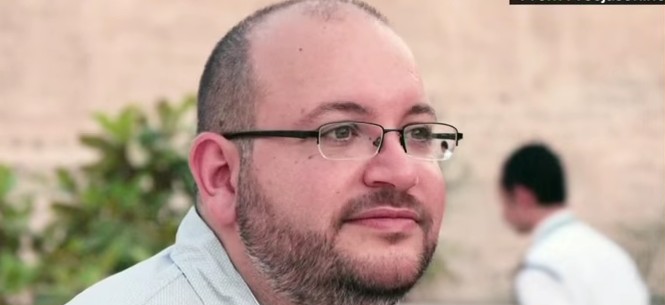The Washington Post‘s correspondent in Tehran, who was arrested by Iranian authorities more than a year ago and was held for nine months without charge, has been convicted in an espionage trial.
Jason Rezaian, an Iranian-American journalist, had been held in Tehran’s notorious Evin prison for longer than the 444 days of the Iran hostage crisis three decades ago. Rezaian’s lawyer said that she was not present in the courtroom at the announcement of the verdict; early reports were unclear whether Rezaian himself was there either. The announcement of his conviction was made on state TV.
The verdict was condemned in a statement by Post executive editor Martin Baron:
Iran has behaved unconscionably throughout this case, but never more so than with this indefensible decision by a Revolutionary Court to convict an innocent journalist of serious crimes after a proceeding that unfolded in secret, with no evidence whatsoever of any wrongdoing.
State Department spokesperson John Kirby also called on Iran to drop all charges against Rezaian.
The Post reported more:
Iranian President Hassan Rouhani has repeatedly suggested a prisoner exchange in recent weeks. He has said Iran might push to expedite freedom for Rezaian and two other Iranian Americans if the United States released Iranian citizens convicted of sanctions violations. Saeed Abedini of Boise, Idaho, is a pastor imprisoned for organizing home churches. Amir Hekmati of Flint, Mich., is a former Marine who has spent four years in prison since his arrest during a visit to see his grandmother.
Rezaian’s case attracted international attention as an example of Iranian government repression, despite Rouhani’s desire to expand personal freedoms in Iran and improve relations with the West.
Iranian authorities accused Rezaian of “collaborating with hostile governments as well as writing a letter to President Obama.” They also restricted his access to legal counsel and prohibited his family from attending the trial or speaking with him. Abolghassem Salavati, the judge presiding over Rezaian’s case, has been sanctioned by the European Union for his human rights record, especially for actions taken against journalists. Salavati also presided over the case of three American hikers who were arrested after they inadvertently entered Iran. The hikers were released after paying $1.5 million in bail.
A Post editorial late last year asked, “If Iranian officials are unresponsive in the case of Mr. Rezaian, how can they be expected to deliver on commitments they make with respect to the nuclear program?”
In Why Does Iran Keep Taking American Hostages, published in the September 2015 issue of The Tower Magazine, Bridget Johnson analyzed Rezaian’s case, as well as the status of Abedini and Hekmati, and explored the history of Iran using American prisoners as bargaining chips for international deals.
[Photo: CNN / YouTube ]




